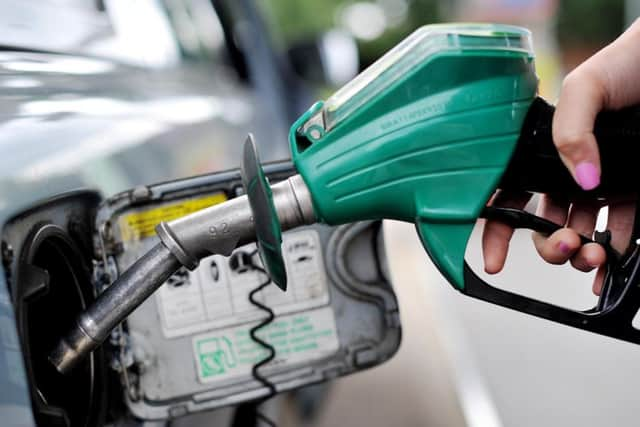Civil servants asked to volunteer to man 75 crisis filling stations across Northern Ireland
and live on Freeview channel 276
In a memo to junior and mid-ranking officials today which has been seen by the News Letter, the Department for the Economy (DfE) set out how the crisis system would operate if it is triggered for the first time since the 1974 Ulster Workers Council strike which toppled Stormont’s first power-sharing executive.
Although the appeal comes less than three months before Brexit, Stormont said the planning was “routine”.
Advertisement
Hide AdAdvertisement
Hide AdCivil servants also stressed that the appeal for volunteers is not because such a crisis is thought to be imminent.


Other worst case scenario plans are being put in place to deal with any possibility of disruption from Brexit.
The documentation seen by the News Letter does not include the full contingency plan and it is not clear whether there is a proposal to shut every filling station with the exception of the 75 sites run by government or whether it is envisaged that supplies will have already run out at most other sites by that stage.
The plan is the responsibility of the same section of DfE which set up the disastrous ‘cash for ash’ scheme, although it is believed that all of those involved in that debacle are no longer in post.
Advertisement
Hide AdAdvertisement
Hide AdUnder its proposal, the government and the oil industry would work together to ensure that fuel continued to be supplied to “organisations and individuals providing key functions, such as hospitals, and healthcare workers”.
The individuals eligible for emergency fuel supplies “would be directed to a network of strategically located filling stations spread across NI and identified as a priority for supply from reduced stocks”. Forty one “general locations” for the emergency filling stations are set out and are listed below.
The scheme would be administered from DfE’s Netherleigh headquarters just outside the Stormont Estate and would involve two civil servants being placed at each of 75 filling stations.
They would be responsible for ensuring that fuel was only going to those with permits identifying them as being on the “priority” list and would also record the amount and type of fuel going out so that Stormont mandarins “can track demand patterns”.
Advertisement
Hide AdAdvertisement
Hide AdProspective volunteers are told that “civil servants will not be expected to police the scheme and would normally be positioned behind the sales counter with filling station employees”.
The documentation includes a paragraph in bold which states that there is no expectation of a looming oil crisis and says that the request for volunteers “does not suggest that any problems are imminent, or anticipated”.
A frequently asked questions document circulated to civil servants asks ‘what happens if customers become irate?’ The answer says that confrontation should be avoided and “if required, the PSNI can be contacted to assist in such circumstances”. There is no mention of Army involvement.
The only potential “negative impact” listed in the document is “negative press feedback against the DfE could be the result if the scheme is not implemented correctly”.
Advertisement
Hide AdAdvertisement
Hide AdThe appeal is separate to another request last month for volunteers to work as part of the civil service command, control and coordination structures” in a “worst case scenario” involving “sustained and widespread disruption” after Brexit.
A DfE spokesman said: “This process is not new and is a routine exercise to bring the resource back to the required capacity.”
Both the national and devolved governments maintain contingency plans for disasters – from pandemics to nuclear war – and the existence of a plan does not in itself mean that officials believe such a threat is imminent.
However it is rare for detailed elements of such plans to emerge publicly before the declassification of government files after 20 years.
Where emergency supplies will be held
Advertisement
Hide AdAdvertisement
Hide AdThe documents circulated within the Civil Service yesterday set out the ‘general location of designated filling station sites’. The list is reproduced as it appears in the documentation:
Londonderry
Ballymena/Ballymoney
Bangor
Lisburn/Moira area
Limavady
Larne
Newtownards/peninsula
Dromore/Banbridge
Coleraine area
Carrickfergus
Downpatrick
Lurgan
Portadown
Craigavon
Ballycastle
Newtownabbey
Ballynahinch
Armagh/Markethill
North/east Antrim
Mallusk
Castlewellan
Newry area
Ballymoney
Greater Belfast
Newcastle
Templepatrick/Crumlin
Omagh
Draperstown
Dungannon
Irvinestown
Castlederg
Magherafelt
Ballygawley
Fermanagh west
Cookstown
Maghera
Augher
Sperrins
Dungiven
Lisnaskea
Strabane
South Co Londonderry
Enniskillen